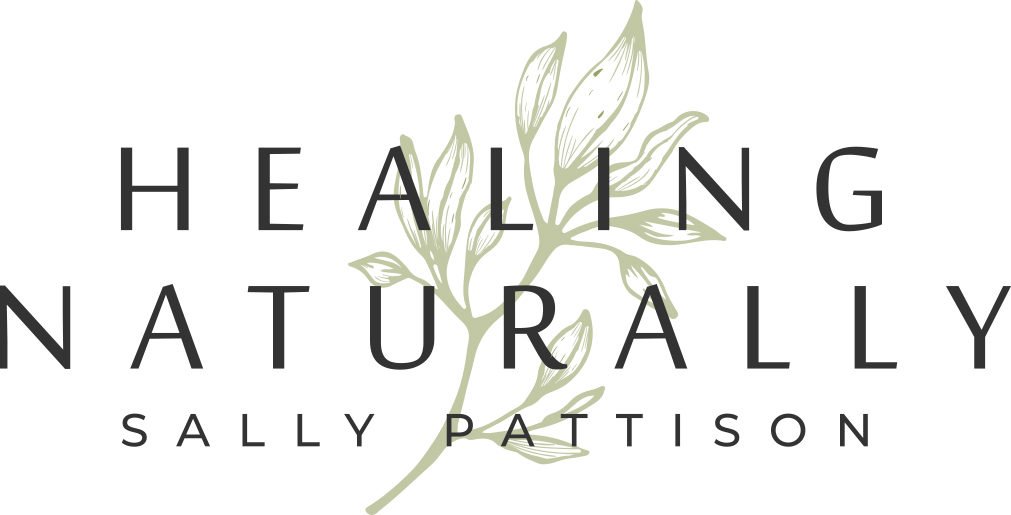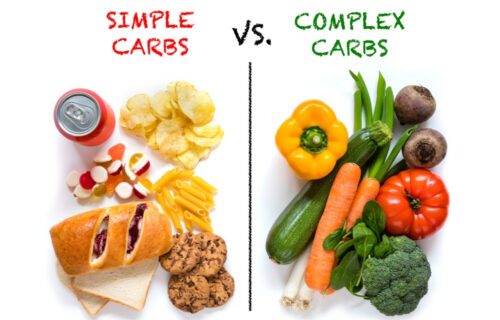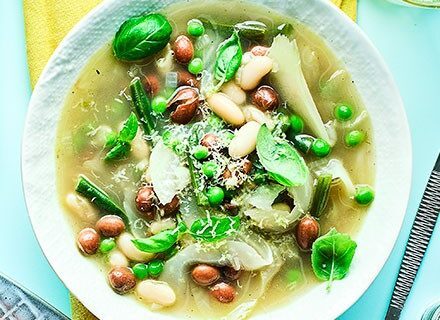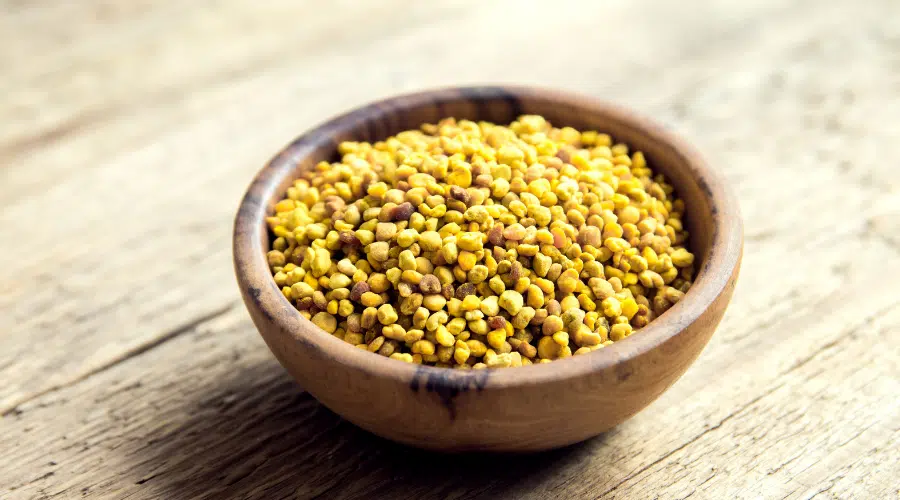
Bee Pollen
Top 11 Health Benefits of Bee Pollen
Bee pollen is a mixture of flower pollen, nectar, enzymes, honey, wax and bee secretions.
Foraging honey bees collect pollen from plants and transport it to the beehive, where it’s stored and used as food for the colony (1).
Bee pollen shouldn’t be confused with other bee products such as honey, royal jelly or honeycomb. These products may not contain pollen or may contain other substances.
Recently, bee pollen has gained traction in the health community because it’s loaded with nutrients, amino acids, vitamins, lipids and over 250 active substances (2).
In fact, the Federal Ministry of Health in Germany recognizes bee pollen as a medicine (3).
Here are 11 health benefits of bee pollen, backed by science.
1. Impressive Nutritional Profile With More Than 250 Active Substances
Bee pollen boasts an impressive nutritional profile.
It contains over 250 biologically active substances, including proteins, carbs, lipids, fatty acids, vitamins, minerals, enzymes and antioxidants (2).
Bee pollen granules consist of approximately (4):
- Carbs: 40%
- Protein: 35%
- Water: 4–10%
- Fats: 5%
- Other substances: 5–15%
The latter category includes vitamins, minerals, antibiotics and antioxidants.
However, the pollen’s nutritional content depends on the plant source and season collected.
For instance, studies have shown that bee pollen collected from pine plants has approximately 7% protein, while pollen collected from date palm packs closer to 35% protein (2).
In addition, bee pollen harvested during springtime has a significantly different amino acid composition than pollen collected during the summer (2).
2. High Antioxidant Content Protects From Free Radicals and Chronic Diseases
Bee pollen is loaded with a wide variety of antioxidants, among them flavonoids, carotenoids, quercetin, kaempferol and glutathione (5).
Antioxidants protect your body against potentially harmful molecules called free radicals. Damage by free radicals is linked to chronic diseases such as cancer and type 2 diabetes (6).
Test-tube, animal and some human studies have shown that bee pollen antioxidants can reduce chronic inflammation, eliminate harmful bacteria, fight infections and combat the growth and spread of tumors (7).
However, bee pollen’s antioxidant content also depends on its plant source (8).
3. May Lower Heart Disease Risk Factors Like High Blood Lipids and Cholesterol
Heart disease is the leading cause of death worldwide (9).
Both high blood lipids and high blood cholesterol are linked to an increased risk of heart disease. Interestingly, bee pollen may lower these risk factors.
For instance, animal studies have shown that bee pollen extracts can lower blood cholesterol levels, especially “bad” LDL cholesterol (10, 11).
In people with nearsightedness caused by clogged arteries, bee pollen supplements lowered blood cholesterol levels, which increased their field of vision (7).
Additionally, antioxidants in bee pollen may protect lipids from oxidizing. When lipids oxidize they can clump together, restricting blood vessels and raising your heart disease risk (11).
4. May Boost Liver Function and Protect Your Liver From Toxic Substances
Your liver is a vital organ that breaks down and removes toxins from your blood.
Animal studies have found that bee pollen may enhance its detoxifying abilities.
In older animals, bee pollen boosted the liver’s antioxidant defense and removed more waste products, such as malondialdehyde and urea, from the blood (12).
Other animal studies show that bee pollen antioxidants safeguard the liver against damage from several toxic substances, including drug overdoses. Bee pollen promotes liver healing as well (5, 13, 14).
However, few human studies have assessed bee pollen’s effects on liver function. More human studies are needed to establish health recommendations.
5. Packs Several Compounds With Anti-Inflammatory Properties
Bee pollen has been used traditionally to reduce inflammation and swelling.
An animal study showed that bee pollen extract reduced swelling of rats’ paws by 75% (15).
In fact, its anti-inflammatory effects have been compared to several nonsteroidal anti-inflammatory drugs, such as phenylbutazone, indomethacin, analgin and naproxen (7).
Bee pollen packs several compounds that can reduce inflammation and swelling, including the antioxidant quercetin, which lowers the production of inflammatory omega-6 fatty acids, such as arachidonic acid (16).
What’s more, plant compounds in bee pollen may suppress biological processes that stimulate the production of inflammatory hormones such as tumor necrosis factor (TNF) (17).
6. May Help You Avoid Illness by Boosting Immunity and Killing Bacteria
Bee pollen may boost your immune system, helping you avoid illnesses and unwanted reactions.
For one, research has shown that it may reduce the severity and onset of allergies.
In one study, bee pollen was shown to significantly reduce the activation of mast cells. Mast cells, when activated, release chemicals that trigger an allergic reaction (18).
Also, several test-tube studies have confirmed that bee pollen has strong antimicrobial properties.
Bee pollen extract was found to kill potentially harmful bacteria such as E. coli, Salmonella, Pseudomonas aeruginosa, as well as those that cause staph infections (19, 20).
7. May Aid Wound Healing and Prevent Infections
Bee pollen has anti-inflammatory and antioxidant properties, which may aid your body in wound healing.
For instance, animal research found that bee pollen extract was similarly effective at treating burn wounds as silver sulfadiazine, a gold standard in burn treatment, and caused far fewer side effects (21).
Another animal study showed that applying a balm containing bee pollen onto a burn significantly accelerated healing over standard medicines (22).
Bee pollen’s antimicrobial properties may also prevent infections, a major risk factor that can compromise the healing process for scrapes, cuts, abrasions and burns (21).
8. May Have Anticancer Properties
Bee pollen may have applications for treating and preventing cancers, which occur when cells proliferate abnormally.
Test-tube studies have found bee pollen extracts to inhibit tumor growth and stimulate apoptosis — the programmed death of cells — in prostate, colon and leukemic cancers (23, 24).
Bee pollen from cistus (Cistus incanus L.) and white willow (Salix alba L.) may have anti-estrogen properties, which could lower the risk of breast, prostate and uterine cancers (25, 26).
However, more human-based research is needed.
9. May Ease Menopausal Symptoms Like Hot Flushes
Menopause, which marks the cessation of menstruation in women, is often accompanied by uncomfortable symptoms such as hot flushes, night sweats, mood changes and sleep disturbances (27).
Studies show that bee pollen may alleviate several menopausal symptoms.
In one study, 71% of women felt that their menopausal symptoms improved while taking bee pollen (27).
In another study, 65% of women taking a pollen supplement experienced fewer hot flushes. These women indicated other health improvements as well, such as better sleep, reduced irritability, less joint pain and improved mood and energy (28).
Moreover, a three-month study showed that women taking bee pollen supplements experienced significantly fewer menopausal symptoms. In addition, these supplements helped lower “bad” LDL cholesterol and raise “good” HDL cholesterol (29).
10. May Improve Nutrient Utilization, Metabolism and Longevity
Some evidence suggests bee pollen may improve your body’s utilization of nutrients.
For instance, iron-deficient rats absorbed 66% more iron when pollen was added to their diet. This uptick is likely due to the fact that pollen contains vitamin C and bioflavonoids, which boost iron absorption (30).
Additionally, healthy rats fed pollen absorbed more calcium and phosphorus from their diet. Pollen contains high-quality proteins and amino acids that may aid such absorption (30).
Other animal studies have demonstrated that bee pollen may improve muscle growth, speed up the metabolism and promote longevity (3, 31).
Although animal studies are promising, it’s not clear if humans experience the same benefits.
11. Safe for Most People and Easy to Add to Your Diet
Bee pollen comes in granule or supplement form and is safe for most people.
You can purchase it at health stores or from your local beekeeper.
The granules can be added to your favorite foods such as breakfast or smoothies.
Warnings:
However, people with pollen or bee sting allergies should avoid pollen products, as they may cause symptoms such as itching, swelling, shortness of breath or anaphylaxis (32).
These products may also interact negatively with blood thinners, such as warfarin (33, 34).
Pregnant or lactating women should avoid bee pollen products, as evidence is lacking that they’re completely safe for babies.
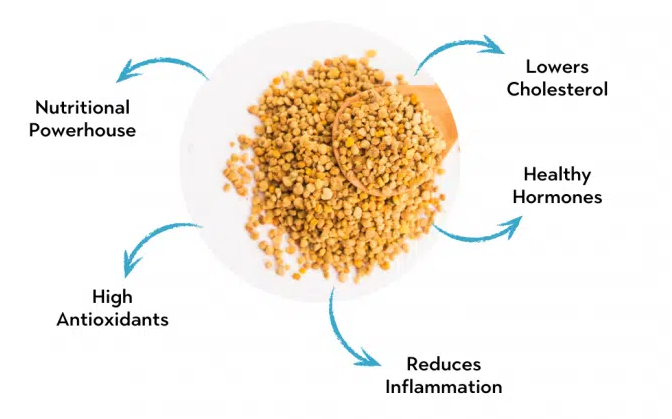 Summary
Summary
Bee pollen contains many vitamins, minerals and antioxidants, making it incredibly healthy.
Studies have linked bee pollen and its compounds to health benefits such as decreased inflammation, as well as improved immunity, menopausal symptoms and wound healing.
However, most of the evidence surrounding bee pollen and its components stems from test-tube and animal studies. More human research is needed to clarify its health benefits.
All told, bee pollen is a great addition to your diet and can be easily purchased from health stores or your local beekeeper
